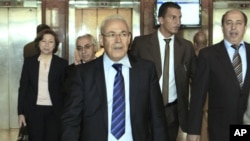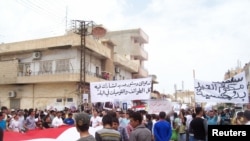The Syrian National Council (SNC) announced earlier this month the selection of Abdulbaset Sieda, a little-known moderate Kurd from Uppsala, Sweden, to - for the next three months - lead the opposition group of mostly Syrian exiles in its effort to dislodge the government of President Bashar al-Assad.
The Islamist-dominated council, the largest coalition of political groupings opposed to the Syrian regime, has been deemed unable by some to provide effective support for the country’s disparate opposition: the political activists who daily risk their lives in street protest, the pockets of Free Syrian Army armed resistance to the regime, and the Kurds and other Syrian minorities who are reluctant to join the uprising. Other exile opposition groups, such as the National Coordination Board for Democratic Change, are smaller and, unlike the SNC, have not gained the endorsement of France, Britain, the United States and other countries supporting regime change in Damascus.
In replacing the controversial Paris-based academic, Burhan Ghalioun, Sieda will lead a troubled organization whose turn-around could determine the future of the increasingly bloody 15-month-old revolution, the success or failure of the attempt to put an end to the Assad regime, and help replace it with a democratic alternative.
Can Sieda lead a restructuring of the council to increase its cohesion and efficacy? Can he create a larger umbrella for Syrians representing the disparate political, ethnic and religious interests of the nation?
Sieda’s stated mission is to reshape the floundering council to unify the membership, chart a course of action, and to appeal to a broader base both within Syria and international community. The task falls to a Syrian intellectual expatriate who has remained in the background of a young organization that has been dominated by his predecessor, Ghalioun, and by Islamists.
Where did the SNC’s new leader come from?
In his first few days in office, Sieda has publicly repeated most of the positions the council has become known for: do not negotiate with Assad, continue to request foreign intervention through the establishment of a no-fly zone and a humanitarian corridor to ultimately unseat Assad and replace his dictatorship with a “democratic and pluralistic state.”
Seida was born in a small town in Hasaka, Syria, a rural Kurdish region in the northeast, surrounded by Acadian, Assyrian, Babylonian, Byzantine and Islamic ruins. After receiving a doctorate in philosophy from Damascus University he taught in Libya for three years, then moved in 1994 with his wife and children to Sweden, where about 125,000 Kurds - mostly from Iraq - now live in exile. He teaches philosophy at the University of Uppsala in Stockholm and elsewhere in the capital.
”Since the creation of the Syrian National Council 11 months ago, Sieda has served on the small executive committee until recently headed by Ghalioun. The council describes him as a man of integrity and independence.
His brief biography on the SNC web site indicates that he serves on a preparation committee and in his academic life has published many papers on Syrian public affairs. SNC spokesperson Bassma Kodmani said he has also written extensively on Kurdish issues. Kodmani emphasized that Sieda is an independent and does not represent any single party or political interest on the 300-member council.
His selection to head the organization was made among a handful of the council’s leaders at a June 9-10 meeting in Istanbul. As with many of their decisions, the choice was based on what Kodmani described as “consensus,” rather than a democratic vote by the membership.
Will Syria’s minorities follow Sieda’s lead?
The day he was chosen, Sieda told a reporter for the Kurdish online newspaper, Rudaw, that he has invited the Kurdish National Council (KNC) to join the Syrian umbrella group. The KNC leadership expressed some optimism that the two groups would work together. KNC leadership praised Sieda for his patriotism but added that success will be determined by his effectiveness as “a bridge of communications to improve relations.”
Kurdish issues loom large in that conversation. Kodmani said the SNC opposed discrimination against Kurds, supports citizenship for all Kurds, and endorses compensation payments for some of the grievances they have against the Assad regime. But she said the SNC cannot endorse other demands such as Kurdish autonomy or federalism without the consensus of the council.
Syrian Kurds generally do not trust the SNC because they see it as a political group created by and in Turkey, says Ayub Nuri, the editor of Rudaw. “The council he leads right now is not liked by many Syrians: Arabs, Christians, Kurds and the other Syrian minority groups.”
Uniting these opposition groups will be a major challenge, said Nuri. “They are deeply divided. They don’t like each other. So anyone, no matter how experienced or how loyal or how hard-working, will have the challenge of satisfying all of these different groups, which I think is impossible.”
Nuri also described the majority of Syria’s Kurds - approximately 10 to 15 percent of Syria’s total population of an estimated 22.5 million - as disengaged from the revolution. Most are unemployed and very poor. They tend to avoid violence because their own struggle with the Assad regime in 2004 ended in the deaths of hundreds of Kurds. “Now, they say the others should do it: ‘We are tired of bloodshed and imprisonment.’”
Can Sieda restructure the Syrian National Council?
Critics of the SNC say future success will be determined not by who is chosen to lead the organization but whether the council is prepared for a structural reorganization on many fronts.
The SNC’s Kodmani said reorganization is taking place, but others are skeptical that significant improvements will be made.
“These problems include issues of transparency, decision-making, how finances are managed, and the lack of a clear vision,” said Amr al-Azm, a Syrian American who teaches archaeology at Shawnee State University in Ohio. A Sunni whose father is a recognized opposition figure and who remains in the SNC, al-Azm was invited to the organizational meetings of the group but declined to join.
“One of the key problems I have with the council is that it is dominated by Islamists, not just members of the Muslim Brotherhood,” said al-Azm. Others have said that Ghalioun - who is a Christian - was put forward by the Brotherhood to downplay their Islamists image. Al-Azm said the Brotherhood supported Sieda for the same reason.
Another member of the SNC, George Sabra - a Christian with close links to Syria’s street activists - was in the running for the leadership position, said Al-Azm. But Sabra was perceived as a threat to the status quo of the leadership, Al-Azm said.
“The Muslim Brotherhood refused to let him take that seat because he is independent-minded. He can make decisions and I think that, in itself, may have interfered with the current balance of power in the SNC,” he said.
SNC’s short history
The short history of the SNC includes charges of the failure of Ghalioun to consult the membership before making important decisions, as well as the failure of the executive to call for votes among the membership. Three months ago, Gulf newspaper Al Arabiya reported that three of the SNC’s founders - a former judge, a human rights lawyer and opposition leader Kamal al-Labwami - complained about Muslim Brotherhood dominance, the council’s failure to arm the rebels. Having charged the leadership with corruption, they left the council. Two have since returned.
“They lurch from crisis to crisis,” said al-Azm. “I don’t see how expanding the SNC to include a few more members of the minorities will fundamentally address the core problems of the SNC, the issues of transparency, leadership and a clear vision.”
Al-Azm is concerned that time is running out for the SNC.
“There is no connection left anymore between the SNC as a sort of political entity and the street which has moved beyond and is not protesting and acting totally independent of such a leadership.”
As the new leader of Syria’s opposition umbrella group, Sieda now presides over a restructuring of the Syrian National Council and a major outreach not only to the nation’s minorities suspicious of the SNC, but to thousands of Syrian activists and fighters in Homs, Hama, Idlib and other centers of revolution. The SNC’s goal remains to refashion the rebel force that could turn an escalating war into a successful toppling of what much of the world perceives as a brutal dictatorship and to become midwife to a new government in Syria. And Sieda has only three months before the executive committee selects his successor.
The Islamist-dominated council, the largest coalition of political groupings opposed to the Syrian regime, has been deemed unable by some to provide effective support for the country’s disparate opposition: the political activists who daily risk their lives in street protest, the pockets of Free Syrian Army armed resistance to the regime, and the Kurds and other Syrian minorities who are reluctant to join the uprising. Other exile opposition groups, such as the National Coordination Board for Democratic Change, are smaller and, unlike the SNC, have not gained the endorsement of France, Britain, the United States and other countries supporting regime change in Damascus.
In replacing the controversial Paris-based academic, Burhan Ghalioun, Sieda will lead a troubled organization whose turn-around could determine the future of the increasingly bloody 15-month-old revolution, the success or failure of the attempt to put an end to the Assad regime, and help replace it with a democratic alternative.
Can Sieda lead a restructuring of the council to increase its cohesion and efficacy? Can he create a larger umbrella for Syrians representing the disparate political, ethnic and religious interests of the nation?
Sieda’s stated mission is to reshape the floundering council to unify the membership, chart a course of action, and to appeal to a broader base both within Syria and international community. The task falls to a Syrian intellectual expatriate who has remained in the background of a young organization that has been dominated by his predecessor, Ghalioun, and by Islamists.
Where did the SNC’s new leader come from?
In his first few days in office, Sieda has publicly repeated most of the positions the council has become known for: do not negotiate with Assad, continue to request foreign intervention through the establishment of a no-fly zone and a humanitarian corridor to ultimately unseat Assad and replace his dictatorship with a “democratic and pluralistic state.”
Seida was born in a small town in Hasaka, Syria, a rural Kurdish region in the northeast, surrounded by Acadian, Assyrian, Babylonian, Byzantine and Islamic ruins. After receiving a doctorate in philosophy from Damascus University he taught in Libya for three years, then moved in 1994 with his wife and children to Sweden, where about 125,000 Kurds - mostly from Iraq - now live in exile. He teaches philosophy at the University of Uppsala in Stockholm and elsewhere in the capital.
”Since the creation of the Syrian National Council 11 months ago, Sieda has served on the small executive committee until recently headed by Ghalioun. The council describes him as a man of integrity and independence.
His brief biography on the SNC web site indicates that he serves on a preparation committee and in his academic life has published many papers on Syrian public affairs. SNC spokesperson Bassma Kodmani said he has also written extensively on Kurdish issues. Kodmani emphasized that Sieda is an independent and does not represent any single party or political interest on the 300-member council.
His selection to head the organization was made among a handful of the council’s leaders at a June 9-10 meeting in Istanbul. As with many of their decisions, the choice was based on what Kodmani described as “consensus,” rather than a democratic vote by the membership.
Will Syria’s minorities follow Sieda’s lead?
The day he was chosen, Sieda told a reporter for the Kurdish online newspaper, Rudaw, that he has invited the Kurdish National Council (KNC) to join the Syrian umbrella group. The KNC leadership expressed some optimism that the two groups would work together. KNC leadership praised Sieda for his patriotism but added that success will be determined by his effectiveness as “a bridge of communications to improve relations.”
Kurdish issues loom large in that conversation. Kodmani said the SNC opposed discrimination against Kurds, supports citizenship for all Kurds, and endorses compensation payments for some of the grievances they have against the Assad regime. But she said the SNC cannot endorse other demands such as Kurdish autonomy or federalism without the consensus of the council.
Syrian Kurds generally do not trust the SNC because they see it as a political group created by and in Turkey, says Ayub Nuri, the editor of Rudaw. “The council he leads right now is not liked by many Syrians: Arabs, Christians, Kurds and the other Syrian minority groups.”
Uniting these opposition groups will be a major challenge, said Nuri. “They are deeply divided. They don’t like each other. So anyone, no matter how experienced or how loyal or how hard-working, will have the challenge of satisfying all of these different groups, which I think is impossible.”
Nuri also described the majority of Syria’s Kurds - approximately 10 to 15 percent of Syria’s total population of an estimated 22.5 million - as disengaged from the revolution. Most are unemployed and very poor. They tend to avoid violence because their own struggle with the Assad regime in 2004 ended in the deaths of hundreds of Kurds. “Now, they say the others should do it: ‘We are tired of bloodshed and imprisonment.’”
Can Sieda restructure the Syrian National Council?
Critics of the SNC say future success will be determined not by who is chosen to lead the organization but whether the council is prepared for a structural reorganization on many fronts.
The SNC’s Kodmani said reorganization is taking place, but others are skeptical that significant improvements will be made.
“These problems include issues of transparency, decision-making, how finances are managed, and the lack of a clear vision,” said Amr al-Azm, a Syrian American who teaches archaeology at Shawnee State University in Ohio. A Sunni whose father is a recognized opposition figure and who remains in the SNC, al-Azm was invited to the organizational meetings of the group but declined to join.
“One of the key problems I have with the council is that it is dominated by Islamists, not just members of the Muslim Brotherhood,” said al-Azm. Others have said that Ghalioun - who is a Christian - was put forward by the Brotherhood to downplay their Islamists image. Al-Azm said the Brotherhood supported Sieda for the same reason.
Another member of the SNC, George Sabra - a Christian with close links to Syria’s street activists - was in the running for the leadership position, said Al-Azm. But Sabra was perceived as a threat to the status quo of the leadership, Al-Azm said.
“The Muslim Brotherhood refused to let him take that seat because he is independent-minded. He can make decisions and I think that, in itself, may have interfered with the current balance of power in the SNC,” he said.
SNC’s short history
The short history of the SNC includes charges of the failure of Ghalioun to consult the membership before making important decisions, as well as the failure of the executive to call for votes among the membership. Three months ago, Gulf newspaper Al Arabiya reported that three of the SNC’s founders - a former judge, a human rights lawyer and opposition leader Kamal al-Labwami - complained about Muslim Brotherhood dominance, the council’s failure to arm the rebels. Having charged the leadership with corruption, they left the council. Two have since returned.
“They lurch from crisis to crisis,” said al-Azm. “I don’t see how expanding the SNC to include a few more members of the minorities will fundamentally address the core problems of the SNC, the issues of transparency, leadership and a clear vision.”
Al-Azm is concerned that time is running out for the SNC.
“There is no connection left anymore between the SNC as a sort of political entity and the street which has moved beyond and is not protesting and acting totally independent of such a leadership.”
As the new leader of Syria’s opposition umbrella group, Sieda now presides over a restructuring of the Syrian National Council and a major outreach not only to the nation’s minorities suspicious of the SNC, but to thousands of Syrian activists and fighters in Homs, Hama, Idlib and other centers of revolution. The SNC’s goal remains to refashion the rebel force that could turn an escalating war into a successful toppling of what much of the world perceives as a brutal dictatorship and to become midwife to a new government in Syria. And Sieda has only three months before the executive committee selects his successor.






